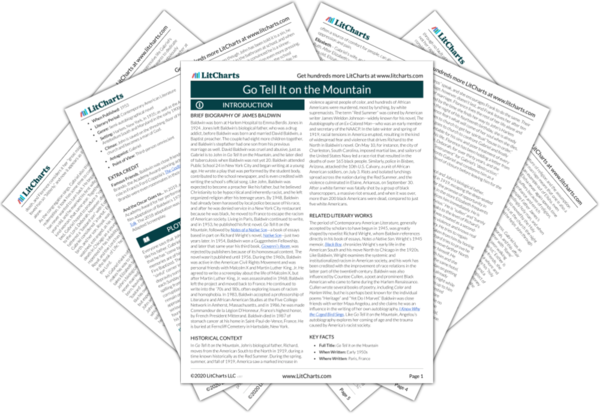The threshing-floor is the surface before the altar in John’s Harlem church, the Temple of the Fire Baptized, and it symbolizes God’s judgement in Go Tell It on the Mountain. In biblical times, harvesting wheat was a laborious process—without machinery, grain had to be separated from the chaff by hand. This typically involved a large flat surface, usually high above the fields so the wind could hit it, where the wheat could be laid out and repeatedly trampled by oxen. The Old Testament uses the image of a threshing-floor to tell stories of God’s judgement. In the Book of Hosea, for example, Hosea prophesized that God would throw the Israelites to the wind, much like chaff blowing from the threshing-floor, because they worshipped false idols, and Baldwin imbues it with similar significance.
Members of John’s church go to the threshing-floor to feel the spirit of God and to be saved and redeemed for their sins. Elisha, one of the temple’s “saints” and preachers, falls to his knees on the threshing-floor and begins “to speak in a tongue of fire, under the power of the Holy Ghost.” Elizabeth goes to the threshing-floor to confess her sins and be saved, but since she is not truly sorry for loving Richard and giving birth to his son, John, out of wedlock, she doubts her redemption. John, too, is moved to the threshing-floor under a mysterious power, and after being thrust into a “darkness” that “has no beginning, and no end,” John is lifted by God and will be rewarded with “eternal life” in Heaven. Having gone to the threshing-floor to be judged by God, John is found to be righteous.
The Threshing-Floor Quotes in Go Tell It on the Mountain
Then the ironic voice, terrified, it seemed, of no depth, no darkness, demanded of John, scornfully, if he believed that he was cursed. All [n_____s] had been cursed, the ironic voice reminded him, all [n_____s] had come from this most undutiful of Noah’s sons. How could John be cursed for having seen in a bathtub what another man—if that other man had ever lived—had seen ten thousand years ago, lying in an open tent? Could a curse come down so many ages? Did it live in time, or in the moment? But John found no answer for this voice, for he was in the moment, and out of time. […] Then his father stood just above him, looking down. Then John knew that a curse was renewed from moment to moment, from father to son. Time was indifferent, like snow and ice; but the heart, crazed wanderer in the driving waste, carried the curse forever.










